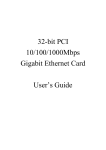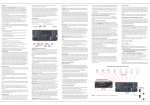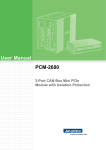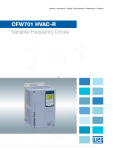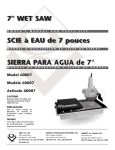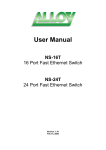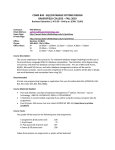Download 64-bit PCI 10/100/1000Mbps Gigabit Ethernet Card User's Guide
Transcript
64-bit PCI 10/100/1000Mbps Gigabit Ethernet Card User’s Guide FCC Warning This equipment has been tested and found to comply with the regulations for a Class B digital device, pursuant to Part 15 of the FCC Rules. These limits are designed to provide reasonable protection against harmful interference when the equipment is operated in a commercial environment. This equipment generates, uses, and can radiate radio frequency energy and, if not installed and used in accordance with this user’s guide, may cause harmful interference to radio communications. Operation of this equipment in a residential area is likely to cause harmful interference, in which case the user will be required to correct the interference at his own expense. CE Mark Warning This is a Class B product. In a domestic environment, this product may cause radio interference, in which case the user may be required to take adequate measures. VCCI Warning P/N: 1907GA2100T5000 Rev.A1-01 TABLE OF CONTENTS INTRODUCTION............................... 1 FEATURES .......................................... 1 GIGABIT ETHERNET TECHNOLOGY ...... 2 FAST ETHERNET TECHNOLOGY ........... 4 UNPACKING AND INSTALLATION5 UNPACKING ........................................ 5 INSTALLING THE GIGABIT ETHERNET CARD ................................................. 6 CONNECTING THE NETWORK CABLE .... 8 SOFTWARE INSTALLATION .................. 8 LED INDICATORS ............................ 9 TECHNICAL SPECIFICATIONS ... 10 INTRODUCTION Thank you for choosing the 10/100/1000Mbps Gigabit Ethernet Card for 32/64-bit PCI Busequipped personal computers. The 64-bit PCI 10/100/1000Mbps Gigabit Ethernet Card is ideal for speeding up data transfers for network servers and other computers, such as those used for videoconferencing, that send and/or receive large amounts of data. The 64-bit PCI 10/100/1000Mbps Gigabit Ethernet Card also includes the newest networking technologies, such as Jumbo frame and multicasting support, that use network bandwidth more efficiently and further help the card maximize data throughput. Features IEEE 802.3, 802.3u and 802.3ab compliant Support 32/64-bit 33/66Mhz PCI Local Bus Master high-speed operation of Rev.2.1/2.2 specification Plug-and-Play installation One RJ-45 connector: Auto detection of 10Mbps Ethernet, 100Mbps Fast Ethernet and 1000Mbps Gigabit Ethernet & Auto MDI-X 1 Supports 10/100/1000Mbps Auto-negotiation operation Full Duplex support for 10/100/1000Mbps data rates Auto MDI-II/MDI-X crossover for all three speeds 128KB RAM on-chip buffer Supports PCI 2.2 Wake-on-LAN for remote wake up 802.3x Full duplex flow control, including automatic transmission of Pause frames based on Rx FIFO thresholds Five LED indicators for easy diagnostic Gigabit Ethernet Technology Gigabit Ethernet is an extension of IEEE 802.3 Ethernet utilizing the same packet structure, format, and support for CSMA/CD protocol, full duplex, and management objects, but with a tenfold increase in theoretical throughput over 100Mbps Fast Ethernet and a one hundred-fold increase over 10Mbps Ethernet. Since it is compatible with all 2 10Mbps and 100Mbps Ethernet environments, Gigabit Ethernet provides a straightforward upgrade without wasting a company’s existing investment in hardware, software, and trained personnel. The increased speed and extra bandwidth offered by Gigabit Ethernet is essential to coping with the network bottlenecks that frequently develop as computers and their busses get faster and more users use applications that generate more traffic. Upgrading key components, such as your backbone and servers to Gigabit Ethernet can greatly improve network response times as well as significantly speed up the traffic between your subnets. Gigabit Ethernet enables Twisted-Pair cable connections to support video conferencing, complex imaging, and similar data-intensive applications. Likewise, since data transfers occur 10 times faster than Fast Ethernet, servers outfitted with Gigabit Ethernet NIC’s are able to perform 10 times the number of operations in the same amount of time. 3 Fast Ethernet Technology The growing importance of LANs and the increasing complexity of desktop computing applications are fueling the need for high performance networks. A number of high-speed LAN technologies have been proposed to provide greater bandwidth and improve client/server response times. Among them, 100BASE-T (Fast Ethernet) provides a nondisruptive, smooth evolution from the current 10BASE-T technology. The non-disruptive and smooth evolution nature, and the dominating potential market base, virtually guarantee cost effective and high performance Fast Ethernet solutions in the years to come. 100Mbps Fast Ethernet is a new standard specified by the IEEE 802.3 LAN committee. It is an extension of the 10Mbps Ethernet standard with the ability to transmit and receive data at 100Mbps, while maintaining the CSMA/CD Ethernet protocol. Since the 100Mbps Fast Ethernet is compatible with all other 10Mbps Ethernet environments, it provides a straightforward upgrade and takes advantage of the existing investment in hardware, software, and personnel training. 4 UNPACKING AND INSTALLATION This chapter provides unpacking and installation information for the 64-bit PCI 10/100/1000Mbps Gigabit Ethernet Card. Unpacking CAUTION: Under ordinary circumstances, the 64bit PCI 10/100/1000Mbps Gigabit Ethernet Card will not be affected by static charge as may be received through your body during handling of the unit. However, there are special circumstances where you may carry an extraordinarily high static charge, and possibly damage the card and/or your computer. It is good practice to eliminate all static electricity by touching a ground (an unpainted metal area of your computer chassis, for example) before performing any installations. 5 Open the shipping carton and carefully remove all items. In addition to this User's Guide, ascertain that you have: One 64-bit PCI 10/100/1000Mbps Gigabit Ethernet Card. One Driver Diskette This User’s Guide. If any item is found missing or damaged, please contact your local reseller for replacement. Installing the Gigabit Ethernet Card Step 1: Shut down the computer, unplugs its power cord, and remove the chassis cover. Step 2: Insert the contact edge of the Gigabit Ethernet card into the connector of any available PCI Bus Master expansion slot. Press the card firmly into the connector such that the card’s contacts are fully seated in the connector, This card can put either in 32-bit or 64-bit PCI slot, but it is recommended that the card to put in the 64- 6 bit PCI slot to have the maximum performance. Step 3: Install the bracket screw which secures the card to the computer chassis. Step 4: Replace the computer’s chassis cover. Step 5: Reconnect the computer’s power cord, and switch computer power on. If the BIOS section of your computer’s boot program is Plug-and-Play compliant, then at power-up the BIOS will automatically configure any newly installed the Gigabit Ethernet Card. NOTE: Due to a fault in some Plug-n-Play BIOS programs, it happens occasionally that a newly installed adapter is assigned an Interrupt Number which is already assigned to another device. In such a case, the conflict of Interrupt Number will cause faults in the behavior of both devices. Then it is necessary to run the CMOS Setup utility, and manually assign a nonconflicting Interrupt Number. 7 Connecting the Network Cable Four pair of Cat.5 UTP or STP cable with RJ-45 connector is required for the 64-bit PCI 10/100/1000Mbps Gigabit Ethernet Card. You can use standard or crossover cable to connect the switch MDI-X or MDI-II port, because the 64-bit PCI 10/100/1000Mbps Gigabit Ethernet Card will adjust the correct signal automatically. Software Installation Before you connect the 64-bit PCI 10/100/1000Mbps Gigabit Ethernet Card to the network, you have to install the network driver first. The driver for each networking operating system is under a separate directory. A HELPME.COM file under root directory lists the information and detailed installation procedure of all the available drivers. 8 L ED I N D I C A T O R S 10Mbps Fast Ethernet Link (10) This indicator lights green when the Gigabit Card is connects to 10Mbps Ethernet Network. 100Mbps Fast Ethernet Link (100) This indicator lights green when the Gigabit Card is connects to 100Mbps Fast Ethernet Network. 1000Mbps Gigabit Ethernet Link (1000) This indicator lights green when the Gigabit Card is connects to 1000Mbps Gigabit Ethernet Network. Activity (ACT) This indicator blinking green will transmitting or received data on the network. be Full-duplex mode (FDX)/ Collision (COL) This LED indicator lights green when the Gigabit Card is work on full duplex (FDX) mode. Otherwise, it is blinking when collisions are occurring on the Gigabit Card. 9 T E C H N I C A L S P E C I FI C A T I O N S General Standards Protocol Data Transfer Rate Topology Network Cables LED Indicator RJ-45 Port IEEE 802.3 10Base-T Ethernet IEEE 802.3u 100Base-TX Fast Ethernet IEEE 802.3ab 1000Base-T Gigabit Ethernet IEEE 802.3u Auto-Negotiation and Parallel Detection IEEE 802.3x Flow Control CSMA/CD Ethernet: 10Mbps (half), 20Mbps (full) Fast Ethernet: 100Mbps (half), 200Mbps (full) Gigabit Ethernet: 1000Mbps (half), 2000Mbps (full) Star Ethernet: 2-pair UTP Cat. 3,4,5, EIA/TIA- 568 STP Fast Ethernet: 2-pair UTP Cat. 5, EIA/TIA-568 STP Gigabit Ethernet: 4-pair UTP Cat.5, EIA/TIA-568 STP 10 Link, 100 Link, 1000 Link, ACT, FDX/Collision Auto MDI-II/MDI-X port Physical and Environmental Power Consumption Temperature Humidity Dimensions EMI: 4.25 watts. (max.) Operating: -10° ~ 40° C, Storage: -10° ~ 70° C Operating: 10% ~ 90%, Storage: 5% ~ 90% 164 x 83 mm (W x H) FCC Class B, CE Mark B, VCCI-B 10














